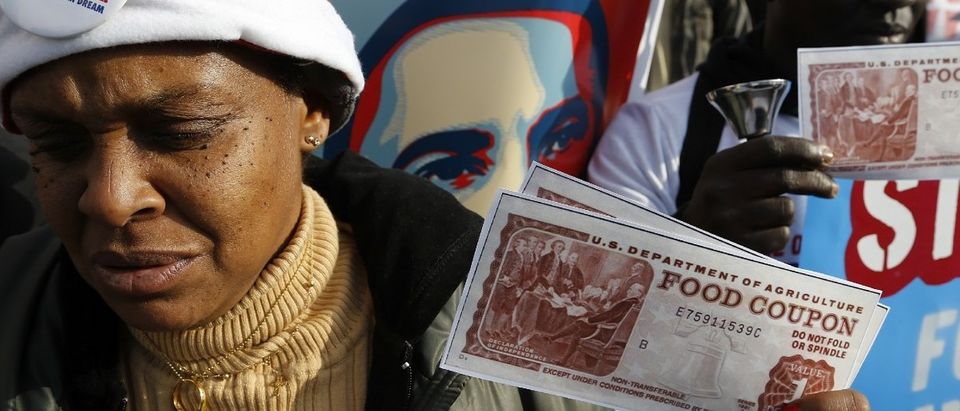President Donald Trump’s administration proposed a massive reorganization of the federal government Thursday that includes moving food stamps and cash welfare programs into one government agency.
The proposed reshuffle, subject to the dubious prospect of congressional approval, would move food assistance programs from the Department of Agriculture (USDA) to the Department of Health and Human Services (HHS), and rename it the Department of Health and Public Welfare.
The goal is to “allow for better and easier coordination across programs that serve similar populations, ensuring consistent policies and a single point of administration for the major public assistance programs,” according to the 132-page document.
Public assistance funds from the federal government, whether cash or “near-cash” like food stamps, also called the Supplemental Nutrition Assistance Program (SNAP), are typically administered by states. The White House hopes that having one set of guidelines from one department would make it easier for states to follow federal regulations.
Most states are not organized with multiple departments handling different assistance programs, Margaret Weichert, deputy director for management at the Office of Management and Budget (OMB), told reporters in a call Thursday. People seeking federal benefits like food stamps or cash benefits from the Temporary Assistance for Needy Families (TANF) program go through a single state office, but those two programs are regulated by different departments at the federal level. Food stamps are regulated through the USDA, and TANF is under the authority of HHS.
“That actually creates burden for the states, and frankly takes away resources that should be given to needy families,” Weichert said. “Of course, this is Washington, there will be plenty of partisan debate on what we intend.”
Critics say Trump wants to save money by reducing enrollment in assistance programs, while the administration insists that its aim is to allow Americans to support their families without government assistance. (RELATED: Food Stamp Recipients Drop Under Trump)
Some even find the name of the proposed new agency to be insulting to the poor.
“They have been using the word welfare because it is pejorative,” Elaine Waxman, a senior fellow with the Income and Benefits Policy Center at the Urban Institute, a Washington, D.C.-based think tank, told The New York Times. “The programs you can call welfare are actually very small in comparison to SNAP, which is an income support necessary to help families, workers and millions of kids.”
There are currently more than 40 million Americans receiving SNAP benefits, but that number was far greater in the years after the Great Recession.
SNAP makes up the majority of the USDA’s budget, and frequently the department’s congressional appropriations bills are passed through a coalition of farm-state lawmakers pushing for greater farm subsidies and more left-leaning legislators advocating for expanded food welfare.
But as the proposal points out, “near-cash benefit programs” — like SNAP, which is administered through bank cards that are only eligible for food purchases — “do not need to leverage USDA’s expertise in food procurement or delivery.”
The proposed shuffle, reportedly based on proposals from the conservative Heritage Foundation, is unlikely to go anywhere in Congress.
Virginia Democratic Rep. Gerry Connolly, who sits on the House Oversight and Government Reform Committee, called the proposal a “wish list for anti-government ideologues.”
“Like every other plan rolled out by this Administration, this is a blueprint for failure that would create dysfunction and chaos in the federal government,” Connolly said.
The White House seemed to recognize the unlikely nature of the proposal.
“Much like President Reagan did in his administration, when he outlined the vision for smaller government, this reform plan will not be implemented overnight, but rather can be used to frame the public discourse over the coming years,” Weichert said.
Follow Thomas Phippen on Twitter
Send tips to thomas@
All content created by the Daily Caller News Foundation, an independent and nonpartisan newswire service, is available without charge to any legitimate news publisher that can provide a large audience. All republished articles must include our logo, our reporter’s byline and their DCNF affiliation. For any questions about our guidelines or partnering with us, please contact licensing@dailycallernewsfoundation.org.


